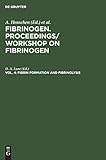Fibrinogen. Proceedings/ Workshop on Fibrinogen. Vol. 4, Fibrin formation and Fibrinolysis ; April, 2–3, 1985, London, England / hrsg. von D. A. Lane.
Material type: TextSeries: Fibrinogen. Proceedings/ Workshop on Fibrinogen ; Vol. 4Publisher: Berlin ; Boston : De Gruyter, [2019]Copyright date: ©1986Edition: Reprint 2019Description: 1 online resource (396 p.) : Num. figsContent type:
TextSeries: Fibrinogen. Proceedings/ Workshop on Fibrinogen ; Vol. 4Publisher: Berlin ; Boston : De Gruyter, [2019]Copyright date: ©1986Edition: Reprint 2019Description: 1 online resource (396 p.) : Num. figsContent type: - 9783110105971
- 9783110871951
- 612.115 23
- QP93.5 .F537 1986
- online - DeGruyter
- Issued also in print.
| Item type | Current library | Call number | URL | Status | Notes | Barcode | |
|---|---|---|---|---|---|---|---|
 eBook
eBook
|
Biblioteca "Angelicum" Pont. Univ. S.Tommaso d'Aquino Nuvola online | online - DeGruyter (Browse shelf(Opens below)) | Online access | Not for loan (Accesso limitato) | Accesso per gli utenti autorizzati / Access for authorized users | (dgr)9783110871951 |
Frontmatter -- Preface -- Contributors -- Contents -- I. Synthesis And Assembly -- A scheme for the intracellular assembly of human fibrinogen -- Evidence that platelet and plasma fibrinogen have the same A-alpha chain gene product -- Fibrinopeptide A and the phosphorylation of fibrinogen -- II. Structure and Function -- Size and shape of the fibrinogen molecule: crystalline forms of native and modified human fibrinogen -- The C-terminal polymerisation domain of fibrinogen -- γ- Chain Crosslinking Of Fibrin At Dd-Trans Contact -- Soluble fibrin contains fibrin polymers of different molecular weight. Ultracentrifugation studies at 37°C -- Relationship of final thickness of fibrin fibers to maximal rate of assembly and to fibrinopeptide B release -- III. Congenital Variants -- Fibrinogen New York 1: The structural, functional, and genetic defects and an hypothesis of the role of fibrin in the regulation of coagulation and fibrinolysis -- Fibrinogen Pontoise - a genetically abnormal fibrinogen with defective fibrin polymerisation but normal fibrinopeptide release -- Fibrinogen Milano I: Abnormal fibrin polymerization related to a carboxy-terrainal defect of the γ-chain (γ-330 Asp Val) -- Fibrinogen "Bergamo I" (Λα 16 Arg - Cys): Alternative methods for structure elucidation -- Screening small plasma samples by HPLC for abnormalities of fibrinopeptide release -- Iv. Fibrin(ogen) And Fibrinolysis -- On the role of fibrin in the fibrinolytic system -- Isolation and characterisation of plasmic degradation products of fibrinogen by high-performance liquid chromatography -- The acceleration of tissue-type plasminogen activator (t-PA)-mediated activation of plasminogen by fibrinogen cyanogen bromide fragments is species specific -- Role of fibrin polymerization in fibrinolysis: Comparison between polymerisable and unpolymerisable fibrins in the potentiating effect of plasminogen activation by tissue-type plasminogen activator (tpA) -- Role of fibrin and its degradation products in the activation of plasminogen by streptokinase and urokinase -- V. Interactions With Cells -- The role of fibrinogen in platelet aggregation -- Platelet-associated fibrinogen: Conformational change of fibrinogen induced by its adsorption to platelet-surface -- Migration of cultured endothelial cells in response to fibrinogen -- Characteristics of the interactions of fibrinogen and soluble fibrin with cultured endothelial cells -- Mechanism of fibrin-induced disorganisation of cultured human endothelial cells -- The fibrinogen: red cell interaction and its influence on blood rheology -- Haemorheologic effects of plasmin and thrombininduced fibrinogen derivatives: An in vitro study -- Binding of human fibrinogen to streptococci and its role in streptococcal pathogenicity -- VI. Assays To Fibrin(ogen) Fragments And Their Use -- Discrimination between fibrin and fibrinogen by a monoclonal antibody against a synthetic hexapeptide representing the amino-terminus of the alpha-chain of fibrin -- A new enzyme immunoassay of fibrin(ogen) degradation products in plasma using a monoclonal antibody -- Fibrin(ogen) degradation products. Determination using a monoclonal anti D neo antibody. Advantages in clinical investigation -- A monoclonal antibody, specific for human fibrinogen and fibrinopeptide A-containing fragments. Its application in an enzyme-immunoassay for fibrinogen degradation products, suitable for use in plasma -- A monoclonal antibody against the CNBr-peptide F-CB3 of the Aα-chain of human fibrinogen -- Clinical aspects of fibrin formation and fibrinolysis measured with monoclonal antibodies against D-dimer -- Fibrinogen derivatives in acute stroke -- VII. Fibrin(ogen) And Disease Pathology -- Triggering of the extrinsic blood coagulation system -- Extravascular fibrin formation and fibrinolysis in a model of inflammation accompanying cellular hypersensitivity -- Extra-vascular fibrin deposition in cellular hypersensitivity - the role of T lymphocyte-macrophage interactions -- Fibrinolytic studies in disorders of connective tissue -- Soluble fibrin/fibrinogen related antigen in human intima in relation to atherogenesis -- Fibrinogen as a possible risk factor for IHD in the Caerphilly study -- VIII. Appendix: Data On Fibrinogen -- Fibrinogen amino acid sequences -- Author Index -- Subject Index -- Backmatter
restricted access online access with authorization star
http://purl.org/coar/access_right/c_16ec
Issued also in print.
Mode of access: Internet via World Wide Web.
In German.
Description based on online resource; title from PDF title page (publisher's Web site, viewed 01. Dez 2022)


